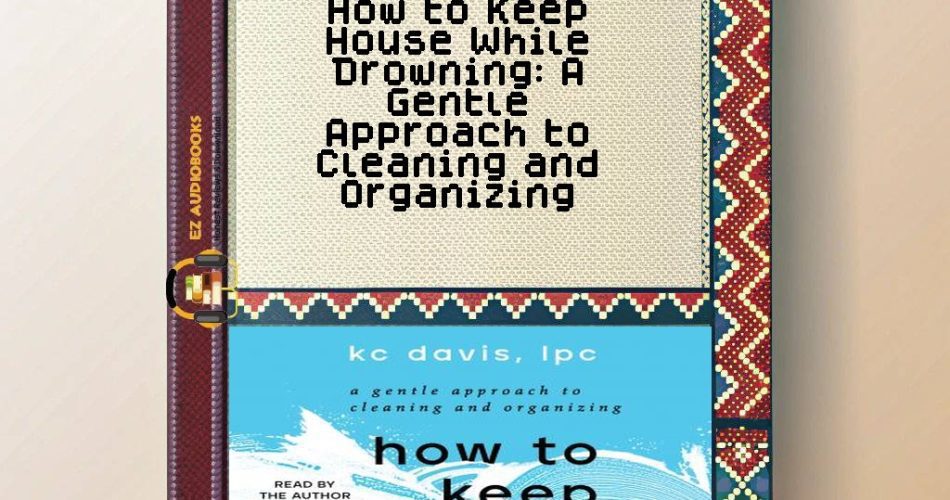Audiobook Sample
Listen to the sample to experience the story.
Please wait while we verify your browser...
- Title: How to Keep House While Drowning: A Gentle Approach to Cleaning and Organizing
- Author: Kc Davis
- Narrator: Dr. Raquel Martin, Kc Davis
- Length: 03:03:33
- Version: Abridged
- Release Date: 26/04/2022
- Publisher: Simon & Schuster Audio
- Genre: Non-Fiction, Self Development, Health & Wellness, Psychology, Home & Garden, Non-Fiction, Self Development, Health & Wellness, Psychology, Home & Garden
- ISBN13: 9.78E+12
The first time I heard Kc Davis’s voice through my headphones, I was sitting on a sun-warmed stone bench in Lisbon’s Jardim da Estrela, surrounded by the comforting chaos of a city waking up. The narrator’s tone – simultaneously firm and tender – cut through my jetlag like a lighthouse beam through fog. It reminded me of the Portuguese grandmother who’d hosted me years before, who’d taught me that ‘a home should hold you, not haunt you’ as she stirred caldo verde with one hand while effortlessly tidying with the other.
‘How to Keep House While Drowning’ isn’t just an organizational guide – it’s a radical act of permission. Davis, a therapist who’s walked through the valley of postpartum depression and ADHD overwhelm, approaches domestic spaces with the same compassionate curiosity I’ve seen in healers from Oaxaca to Kyoto. Her central thesis – that care tasks are morally neutral – lands with the quiet power of a monastery bell at dawn. As someone whose nomadic lifestyle often leaves me oscillating between obsessive tidiness and surrender to chaos, I found myself nodding along like Davis was articulating secrets my bones had always known but my brain had refused to acknowledge.
The audiobook’s dual narration creates a beautiful call-and-response effect. Dr. Raquel Martin’s warm, steady delivery grounds the psychological framework, while Davis’s own voice (heard in personal anecdotes and the book’s more vulnerable passages) carries the intimate crackle of a friend confessing over late-night tea. Their voices weave together like the braided rugs in that Lisbon kitchen – practical yet beautiful, functional yet full of heart.
What makes this listening experience extraordinary is how Davis reimagines domestic spaces through a trauma-informed lens. Her ‘Five Things’ method (identifying just five key categories in any room) mirrors the way I learned to navigate foreign cities – by finding my ‘anchors’ (a distinctive church spire, a particular cafe scent) to avoid overwhelm. When she describes treating a pile of laundry as ‘clothes waiting to care for you’ rather than ‘proof of failure,’ I recalled a Berber woman in Morocco who taught me to fold garments while whispering blessings for the people who would wear them.
The audio format particularly shines during Davis’s ‘kindness mantras,’ which punctuate chapters like gentle exhales. Hearing ‘You deserve a functional space’ in the authors’ voices while washing dishes or riding the subway creates neural pathways that reading alone can’t match. There’s a reason this book became a TikTok phenomenon – its lessons are meant to be absorbed through the body as much as the mind.
Compared to other home organization titles (which often feel like being scolded by a particularly efficient aunt), Davis’s approach shares more DNA with Buddhist teacher Thich Nhat Hanh than Marie Kondo. While the latter focuses on perfection, Davis champions ‘good enough’ – a philosophy that resonates deeply with my travel-worn soul. Her discussion of ‘rest stops’ (small oases of order in chaotic spaces) reminded me of making hotel rooms feel like home by always unpacking my notebook and a single photo first.
If the audiobook has a limitation, it’s that some listeners craving rigid systems might find its flexibility disorienting. But for those of us who’ve felt the crushing weight of undone dishes at 2am or the shame of a guest-ready home that never materializes, this is liberation theology for the domestic sphere. The production quality enhances the message – subtle background sounds of pages turning or a kettle boiling create an ASMR-like intimacy.
As I write this from a cluttered Barcelona apartment (laundry piled artistically on the chair I’m not using), I’m implementing Davis’s ‘Sunday Reset’ – not as a punishment, but as love letters to my future self. The audiobook’s greatest gift isn’t spotless counters, but the dismantling of the lie that messy homes mean messy souls. After years of either avoiding homemaking or treating it like a competitive sport, I finally understand what my Portuguese host meant – a home should be a sanctuary, not a scorecard.
With gratitude for the messes that make us human, Marcus
Marcus Rivera

